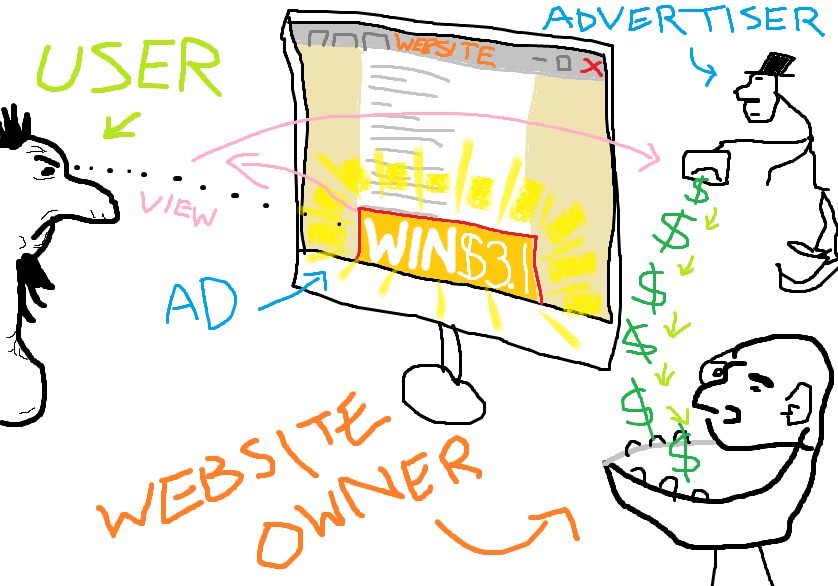Warning: This blog is old and deprecated. It may be wrong or misleading, and it does not represent the author's current positions.
Going shopping anytime soon? Know how to spend money wisely and have no regrets the next time you visit Amazon. Perhaps you’re undecided about buying a shiny GTX 1070—is there a better way to use your money? Find out today!
insert_linkLearn This Truth and You'll Have No Regrets
Don't we all just love the sensation of buying something new? However, whether it's a graphics card or cable ties you would always want to spend money wisely.

Alas, not everyone knows the trick of this trade (spending money wisely). By contrast, you can learn to effectively control your wallet's output.
Temptingly easy to fall into, we must first conquer a commonly used methodology applied to innumerable purchases around the globe. When you go out to buy something, do you know what you're looking for? And, by that, I really mean: do you know what exactly you are looking to buy?
After all, if your desire is to spend money wisely, you'll obviously need to know what you're spending it on!
For example, violently grabbing your eye, you might come across a nifty little smart gadget on the dark web. Despite just encountered the device, you sprinkle money all over that brand with a vast spade. But here's the deal—you did not know what you were buying.
In brief, my primary point here is to emphasise that you spend money wisely when you know what you're spending it on. Therefore, the straightforward steps that follow reinforce this idea.
In other words, they will help you tremendously in deciding what to buy.
Discover the VPN for you: Private Internet Access vs NordVPN? The Best Deal (2018)
insert_linkStep 1: Step Back and Avoid Impulse Buying Like the Plague
Linking astonishingly closely to what was previously discussed, I urge you to resist your urge to buy on impulse. Indeed, this is in spite of the countless varied tactics marketers use to extract your soul from your body's juicy tenderness. (As well as, of course, your money.)
Unfortunately, a plethora of techniques encourages innocent shoppers to buy more than they need. These may include:
- Limited-time offers
- Limited stock (so you want to buy before that Echo Dot runs out!)
- Exclusive offers and discounts
- "Buy more than you actually need, and we'll give you a 10% discount on your 117th purchase!"
- A sheer abundance of advertisements
- "Oh look, this product goes extremely well with what you're buying here. Add it to your cart as well!"
- "Okay, yes, this mug is stupidly expensive, but it's not as expensive as this 'high-end' model!"
Whenever you make an impulse-driven purchase, usually, you've made the wrong decision. This is because impulse buying is not taking advantage of an opportunity. Rather, it is falling victim to devilish marketing techniques.
[caption id="attachment_2213" align="aligncenter" width="838"]
 Advertisements and special offers are designed to benefit themselves, not you.[/caption]
Advertisements and special offers are designed to benefit themselves, not you.[/caption]
That being said, I would like to clarify that I'm in no way opposed to ethical marketing techniques. They might, to your inconvenience, affect your ability to spend money wisely, so be vigilant!
A wise purchase is always an educated purchase; when you have done your fair share of research such that you know what to buy, you're pretty toasty.
Subsequently, you're in a position to avoid buying anything other than what you truly need the next time you pop on over to Amazon.
Okay, with that in mind, how would one know whether they should buy a particular product? Let us proceed further!
insert_linkDon't Be a Victim of "The Happiness Fallacy"
In the (very good) book, 59 Seconds, Big Boi Wiseman talks about the plague that is "materialism". By this, we mean the ceaseless desire to buy new material products in order to gain happiness.
 Well, it turns out that buying new possessions does not make you any happier.
Well, it turns out that buying new possessions does not make you any happier.
Indeed, you will inevitably experience the initial burst of enjoyment of something new. As time progresses, though, this enjoyment will wear off and homeostasis brings you back to normal.
While it may valuable to what you do, buying a new sports car brings you no long-term happiness.
Remember this the next time you're hit with the overwhelming excitement over buying a render farm. Will it make your life any happier? No.
So it is that—to spend money wisely—you must always distrust your "gut".
Related—spend less on electricity: Your Computer's Power Consumption: Should You Care?
insert_linkStep 2: Match the Solution to The Problem (Not Vice-Versa)
The next part of our journey is identifying whether a certain product is actually necessary. After all, it's not spending your money wisely to buy something utterly useless.
For example, Bob sees these smartwatches as he surfs the dark web. Inspecting ever so closer, he concludes that these devices are pretty useful; they can all track Bob's heart rate and it looks like they encourage exercise.
Accordingly, Bob glances upon his own life then thinks to himself,
"Well, I suppose I could do with a wristwatch that tracks exercise—perhaps I'll take up running. Heartrate data and sleep tracking seem perfect for me too!"
He, following this thought, bought every smartwatch on the market. Despite his prior enthusiasm, his purchase never really made much impact on his life. It became unused and forgotten, as one could predict.
He was under the illusion that his purchase would bring him great happiness, but it didn't.
So, what did Bob do wrong? I'll tell you:
The foolish man saw a flashy product hence desired it for the pure novelty. Moreover, Bob fabricated further—seemingly valid—reasons why buying this product would be a good idea.
Quite wrongly, this consisted of finding problems to match to the solution.

insert_linkHunt Down Your Item to Make "Lean" Purchases with Minimal Regret
On the contrary, you could spend money wisely by matching your problem to the solution. In order to do this, you must:
- Identify a problem in your life (for instance, lacking sleep)
- Research, evaluate, then select a solution to the problem (e.g. a smartwatch)
- Narrow-down your options to a product that solves your original problem (e.g. Fitbit Charge 3)
Contrasting last time, this approach entails finding a product based on your problems—not the other way around; buy a product based on one reason and one reason only!
This is in fact, something I have learned from the book Antifragile: you've spent money wisely when you did so for only a single reason, no more.
After all, a good purchase demands just one good reason.
Furthermore, you may find that a product solves your problem, yet it boasts additional features. While extra details could provide a more worthwhile purchase, it can sometimes be too easy to go overboard. Thus, be careful that you don't spend any more than you need.
You want to be hunting the specific product—so don't let the product come to you. That's when poor decisions occur.
More monitors than you need: Are Dual Monitors Worth It? [Don't Make My Mistakes]
insert_linkStep 3: Don't Forget the "Value Test"
Finally, in the series of simple steps, I've got a fun test for you to try out.
You want to spend money wisely, but how would you know what is wise to buy? In order to answer that question, we must first consider what the true purpose of a purchase is:

Generally, we buy stuff for ourselves because we expect that it will bring value to our lives.
"That does sound logical, I must say. Regardless, it is imperative that I first understand what you mean by 'value'."
'Tis the case.
As a matter of fact, "value" can be anything you want it to be. With that said, something of value invariably helps you achieve your goals—whatever they may be; if it brings you value, it is truly advantageous to you.
Here are a few examples of what "value" may mean to you:
- Entertainment (the Cryptic Butter YouTube channel)
- Satisfaction of your stomach (food)
- Better sleep
- Increased productivity
- Ability to render superb animations of a tunnel (powerful computer)
- More friends (Cryptic Butter party hat)
With this in mind, you are now eligible to utilise the "value test". Since I have honestly made this up on the spot, I'll merely pass on the following questions to you. Remember to consider them each time before making a purchase to ensure you spend money wisely:
insert_linkCritical Questions to Ask Yourself Every Time Before You Buy
-
What value would the purchase bring to my life?
- Will it make my life easier or otherwise improve it?
- To what extent does this purchase help me achieve my long-term goals?
- Do I actually need it, or do I just want it?
-
Will a really end up using the product, or would it become abandoned and unused?
- How often will I use this product and gain from it?
- For how long will the product be useful to me?
-
Is the product durable such that it will last a long time without replacement or repair?
- How far will my money take me?
-
Does the purchase align with my budget?
- Is the value I will get worth the amount I will spend?
- Are there any cheaper products that can fulfil my need just as well?
These questions may act as your guide to spend money wisely—so use them wisely! Write them down for future reference, perhaps.
insert_linkYour Purchase Is an Investment—Good or Bad
 Also, remember to consider the effect on your purchase on your life—your success.
Also, remember to consider the effect on your purchase on your life—your success.
To demonstrate, you could buy a £300 graphics card, benefitting from many a Blender render. However, how useful is this really for your future success?
Conversely, investing in educational material might not have as much of an immediate benefit. Despite that, it could revolutionise your life for decades to come, providing rare, valuable opportunities.
And that's the key: treat your purchases as investments. Ask yourself, what will the return be on your investment?
insert_linkSet Out Your Priorities Straight to Optimise Your Expenditures
Next, prioritise: create a shopping list of everything you will find value in and order them based on the value test.
Get your life in order: 7 Online Productivity Tools: Never Waste Your Time Again
In theory, a shopping list ordered by priority will aid you in making stronger decisions, so you spend money wisely! Having employed this technique myself, I must say it genuinely does clarify what does and doesn't need buying.
To exemplify: should you buy that GTX 1070 as a "Christmas gift" to you from yourself? But wait—is there anything better to spend your money on?
Well, now you know! With a list of priorities, you can easily identify any purchase that is more worthwhile given your current budget.
It's great!
insert_linkFurther Paths to Spend Money Wisely
A few books that will also help you spend money wisely:
[caption id="attachment_803" align="aligncenter" width="1024"]
 This is not the wisest way to spend your money...[/caption]
This is not the wisest way to spend your money...[/caption]

